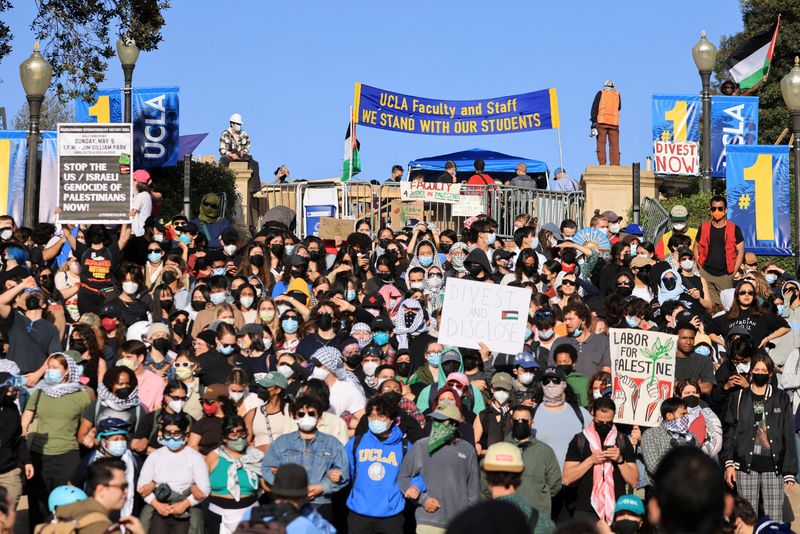By Trevor Hunnicutt, James Oliphant
WASHINGTON (Reuters) -Escalating campus protests are forcing U.S. President Joe Biden to walk a careful line of denouncing antisemitism while supporting young Americans' right to protest and trying to limit longer-term political damage.
As violent police crackdowns and counter-protests greet spreading demonstrations across U.S. campuses, Biden faces sharp criticism of his Israel policy from both the left and right.
Students at dozens of schools have rallied or camped out in recent days to oppose Israel's war in Gaza, demanding institutions stop doing business with companies that support the war.
Protests over the war, and Biden's strong support for Israel, have dogged the president since late last year and divided his Democratic Party. On Wednesday, 57 Democrats in Congress asked Biden to withhold aid to Israel in an attempt to stop a planned assault in Rafah.
Senior Biden aides privately dismiss the idea that the protests or their supporters could cost Biden the White House at the presidential election in November. They point to the relatively small number of participants, compared to some 41 million eligible 'Gen Z' voters in 2024.
The White House has rolled out a series of young voter-friendly policies in recent days, issuing fresh student loan relief announcements, long-planned steps to lower criminal penalties on marijuana and condemning a new six-week abortion ban that took effect on Wednesday in Florida.
Biden has spoken rarely, and carefully, on the campus protests. “I condemn the antisemitic protests," he said on April 22. “I also condemn those who don’t understand what’s going on with the Palestinians.”
But, at least as long as the school year continues, the protests are not going away. Republicans and conservative media have seized on the issue to criticize Biden.
Some rank-and-file Democrats warn that young voters, already ho-hum on Biden, could desert him over Israel.
More than 34,000 people have died in Gaza, local officials say, after attacks by Israel in retaliation for Hamas's Oct. 7 assault that Israel says killed 1,200.
The U.S. is a top supplier of military aid to Israel and has shielded the country from critical United Nations votes.
The Biden campaign's research shows that most 2024 voters, including the young, are going to choose a president based on issues like the economy, not Gaza.
His youth-friendly policies are not enough to guarantee support, said Elise Joshi, executive director of Gen-Z for Change, a group of young online political activists.
"I welcome the policies on marijuana reform and student debt but the president has not weighed in on these protests, which is top of mind for young voters around the country," said Joshi. "The White House is condemning student protesters but we have heard nothing about those attacking the protesters."
'RAGING LUNATICS'
Republicans, meanwhile, have used the protests to brand some Democrats as chaos merchants and antisemites.
Republican presidential candidate Donald Trump on Wednesday praised New York police officers who raided a Columbia University building occupied by pro-Palestinian students and called the demonstrators "raging lunatics."
Biden, Trump added, "is nowhere to be found."
Republican campaigns are accusing Democrats of supporting "antisemitism" and “pro-terror protesters,” while promoting vulnerable incumbents such as Representatives Mike Lawler and Anthony D’Esposito, who both represent New York swing districts with large numbers of Jewish voters.
Biden has not visited a campus to discuss the demonstrations but is due to deliver commencement addresses later this month, including at Morehouse College in Atlanta, where some students and faculty asked that the president's invitation be withdrawn.
Nsé Ufot, founder of the New South Super PAC, said Democrats risk their support with young voters if they don't listen to their anger over Gaza.
"The narrative has changed," said Ufot, who has worked to animate young voters of color in the competitive election state of Georgia. "They should listen to their base."
A Quinnipiac University poll last month found 46% support for aid to Israel for the war against Hamas and 44% opposition. But among U.S. registered voters aged 18-34 just 25% supported aid to Israel, and 66% opposed.
A Reuters/Ipsos poll in March showed Americans age 18-29 favoring Biden over Trump by just 3 percentage points - 29% to 26% - with the rest favoring another candidate or unsure of who if anyone would get their vote. Biden carried the youth vote by 24 points in 2020.

Asked if Biden was worried he could lose the youth vote in November's election given the protests, White House spokeswoman Karine Jean-Pierre on Wednesday pointed to actions on student debt and climate change.
"The president has taken a lot of policy actions here that he knows that young people care about, and a lot of those actions are popular with those young folks," she said.